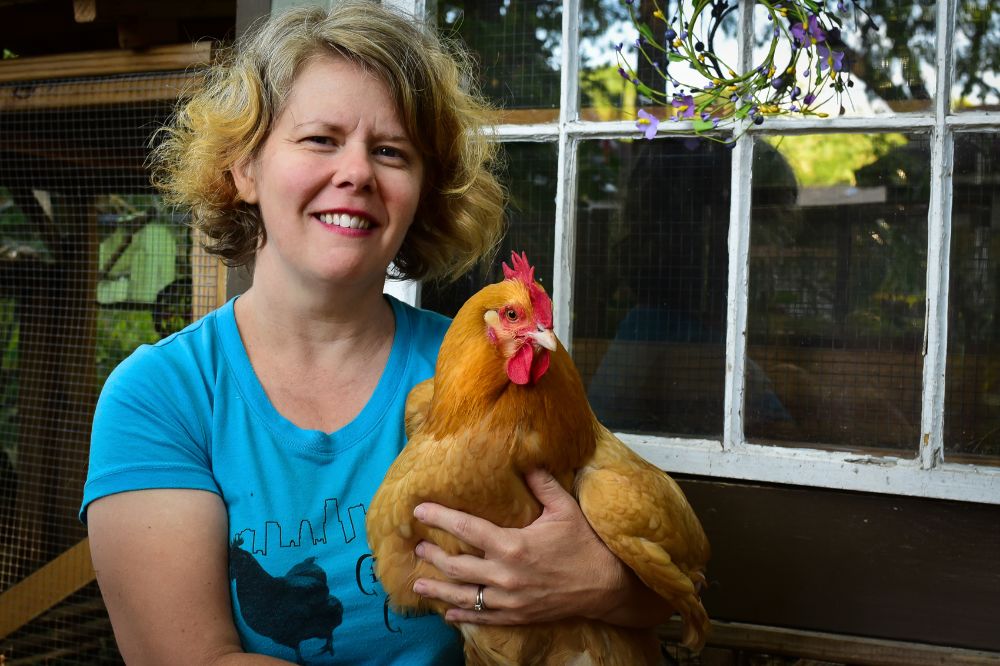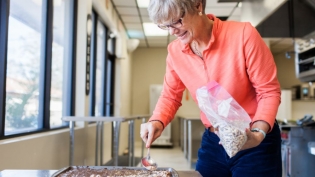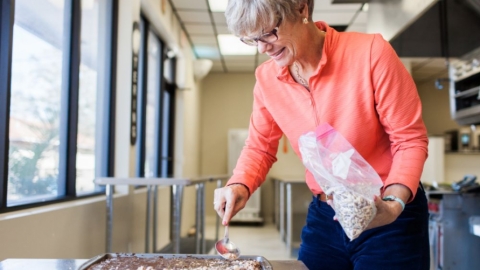Genora Crain-Orth on Keeping a Chicken in Every Yard
After successfully convincing Jacksonville's city council to approve a pilot program allowing residents to raise chickens in their backyard within certain neighborhoods, Genora Crain-Orth continued to advocate for a permanent urban chicken keeping program, which passed in 2015. From there it was on to the Beaches area, where she remained diligent in her efforts to educate community members about the benefits of city chicken keeping, providing information on how best to integrate the birds into the landscape. Her biggest challenge? Not having a big enough yard for more chickens.
What is the mission of River City Chicks and how did you get started with this community group?
River City Chicks, Inc.’s mission is to support, educate and encourage community participation in backyard chicken keeping and urge responsible husbandry of urban flocks in the river city.
I worked with Lauren Trad and a local group called Hens in Jax in 2013 to successfully lobby Jacksonville City Council to approve the backyard chicken pilot program which passed on a 9 to 7 vote in November of 2013. After the pilot program’s approval, Hens in Jax effectively called it quits, and I decided that there was still a need for a hen keeping advocacy group. So, in 2014, I started River City Chicks, Inc. Based on the success of the pilot and the hard work of dozens of volunteers, we were successful in getting a permanent backyard chicken keeping program approved in 2015 on an 18-0 vote by the Jacksonville City Council.
What's your background? How did you learn about poultry farming?
My background, hmmm…definitely not that of a farmer! I grew up as a Navy brat, moving from town to town every couple of years. My father retired in Jacksonville and I’ve been here since I was in 5th grade. I’ve always loved gardening and animals, so keeping a backyard flock just seemed like a natural next step. As a mom, I also wanted my child to appreciate where food comes from and what it takes to produce it, so I went rouge and got three chicks in 2012. While they were in a brooder inside, I went door to door to my immediate neighbors to ask if they would have any issues with us keeping a flock in our backyard, since technically, I was doing so illegally. Thankfully none had any objections. With the help of a handy neighbor (who’s vintage Chevy I also sport around in... thanks Jerrod!), we constructed a beautiful coop (much with salvaged materials). To this day my husband, Jimmy, jokes that he’s waiting on one of our girls to lay a golden egg to recoup (pun intended) the cost. To be clear, I have a corporate day job. Backyard chicken advocacy through River City Chicks, Inc. is something I do on my own time. To do that, I literally immersed myself in all things chicken and learned everything I could about them. Here I am today!
It seems that much of what you do is educating the local governmental officials. What has your experience been like trying to influence and change the direction of the county ordinances?
Educating elected officials about the benefits of chicken keeping and addressing the numerous misconceptions were two of the keys to the approval of this ordinance. I can’t tell you how many people ask, ‘Honey, how are you going to get those hens to lay eggs without any roosters?’ My response, while gesturing, is to explain ‘the same way a woman makes eggs every month without the help of a man… I only need a man if I want that egg fertilized. Incidentally, the eggs you buy in a grocery store are not fertilized’. This just speaks volumes to me of how far removed we are from how our food is made.
Another misconception is that chickens are farm animals. In many parts of the city, especially older ones like Riverside where I live, it wasn’t uncommon many years ago for folks to have a backyard flock. Unfortunately, ordinances were introduced in the 50’s and 60’s forbidding backyard flocks. Chickens were then relegated to farms. Prior to that, they were city chicks.
Lastly, most people’s understanding of chickens is associated with Confined Animal Feeding Operations (CAFO) where animals are crowded into a confined space, creating problems with odor, disease, noise, and pollution. Unfortunately, the problems that come from CAFO's are thought by some to also be associated with backyard flocks. This isn't what I have in my backyard.
What's the most challenging part of raising chickens in your yard?
Not enough space for more chickens? Seriously, it’s not that hard, and in my mind, not that much different than being responsible for any other pet. The difference is that this pet, in addition to companionship, provides food for my family, useful manure for my garden and pest control for my yard.
My challenge has been integrating the ladies into our landscape. I have a wonderful book named ‘Free-Range Chicken Gardens’ by Jessi Bloom. The gardens depicted are beautiful, and the flock is integrated into the landscape. I've found though that my girls will peck, scratch and generally destroy any plants I try to grow. Our compromise is that my girls have a corner of the backyard and a chunnel (chicken tunnel) to a patch of sea shell ginger on the other side of the yard. That way, for the most part, the things I plant stay and they can scratch and peck to their heart’s content. I've also found that chickens HATE piles, so I pick up bags of oak leaves before yard trash day and randomly dump piles in their run. This allows them to be a chicken by pecking and scratching and gives me a great medium for amazing composted manure.
We talk a lot about seasonal ingredients and consumers, chefs, restaurants, artisans and farms working together as a "food system." How do you see backyard flocks as part of that system?
I see backyard flocks as integral to the food system. A backyard flock has granted me an unparalleled view of how food is produced. Granted, my chickens are pets and won’t end up in the stew pot, but our family does eat some meat and we’re more conscientious about the meat we purchase. More importantly, having a flock has been a great way to show my eight-year-old son the importance of being responsible for your pets. After all, his pets make his breakfast and provide compost in which to grow his veggies in our front yard raised beds. It’s heartening for him to so readily grasp the circle of chickens, compost and vegetables – we feed and care for the chickens, they produce eggs and manure for us, we compost and age the manure, then use the compost in our raised beds and grow veggies for us and the chickens. What more perfect food system is there?
What plans do you have for the future? What are your biggest challenges?
Backyard flock expansion throughout the River City! Seriously… River City Chicks, Inc. is working with commissioners and residents in both Neptune and Atlantic Beach in hopes of getting legislation passed in each of those communities that would legalize backyard chicken keeping. As was the case in the City of Jacksonville, education and counteracting misinformation are two of the biggest hurdles. I can speak with confidence in each of these communities as a proud owner of a legal backyard flock and address these concerns, and have lovely blue and brown eggs to boot.
I also love sharing my love of chickens with the community. It’s amazing to watch how a crowd, especially kids, react to calm, big, beautiful chickens! Our native friendly yard and backyard chicken coop was featured on the Riverside Avondale home tour a few years ago. The girls have been featured at GastroFest and the Green Lion Festival for the last two years. I’ve taken a couple of the ladies to Academie de Montessori and the Sanctuary on 8th Street to teach children about backyard flocks. I recently brought a chicken and provided a presentation on backyard flocks and green roofs (which we have… in the historic district!) with the Dogwood Circle of the Mandarin Garden Club. Finally, a couple of the girls and I are headed to the Tree Hill at the end of April for the annual Butterfly Festival.
My intent with River City Chicks, Inc. is to continue educating people in our community about the benefits of backyard flocks. I realize chickens aren’t for everyone, and that’s fine, but I’m going to continue to do all I can do to raise the level of awareness in our community about how amazing they are.
Honey (a Buff Orpington), Roxy (a Plymouth Barred Rock) and Edna (a Black Australorp) have been amazing chicken ambassadors! Zora, our Auracauna, who’s flightly, has been cheering them on from home. I couldn’t be more proud of my brown and blue egg laying flock.
Finally -- what advice would you give to women who are interested in working to change the way we access our food, and encourage growing/raising more food at home?
Hmm…. Find a way to do it! Whatever scale you can manage, you can have an impact on yourself, your family and your community. We need to start caring about how our food is produced. Frankly, there’s no better way than to take an active role in some way, shape or form. There’s no better feeling of satisfaction than dirt under your nails, whether in your own garden, a community garden or part of community supported agriculture plot. It’s vital that we know where and how our food is made. To quote the Lorax, ‘Unless someone like you cares a whole awful lot, nothing is going to get better. It's not’.








